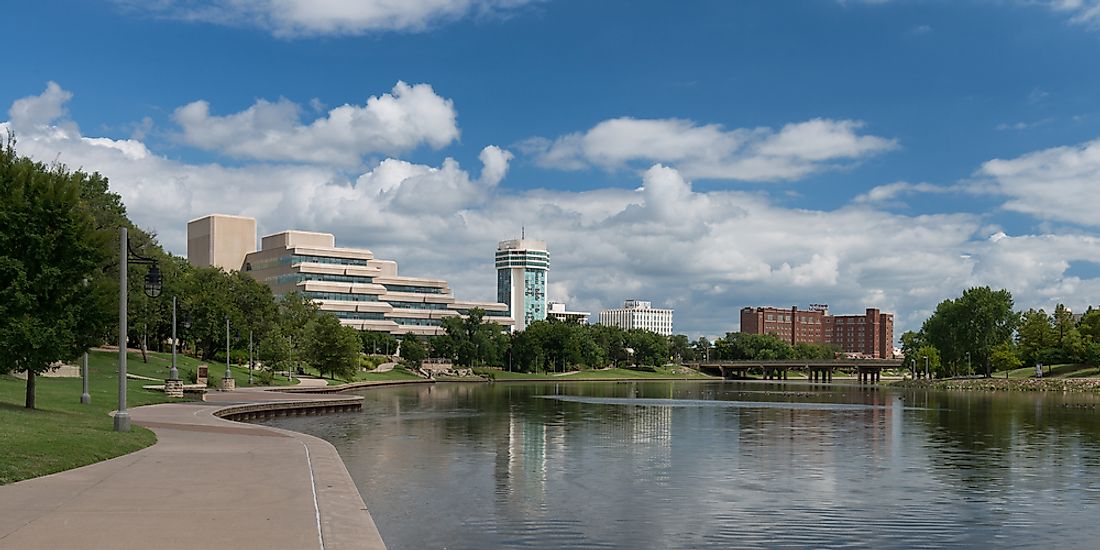The 10 Longest Rivers in Kansas

The US state of Kansas is located in the Midwest part of the country and shares its northern boundary with Nebraska, Oklahoma, Missouri, and Colorado. Kansas is located at approximately the midpoint between the Atlantic and Pacific oceans. The name of the state is derived from the Kansa Native American people who lived in the region, particularly in the river valleys. The first Europeans settled the area in 1812, and the state was admitted to the Union in 1869. The state of Kansas has several rivers, and the Missouri River defines its northeastern border and covers a length of about 75 miles.
Longest Rivers in Kansas
Missouri River
The Missouri River is North America’s longest river and covers a length of 2,340 miles. The river originates in the Rocky Mountains of western Montana and flows east and then south before joining the Mississippi River. The Missouri River has a drainage area of about 0.5 million square miles, and covers parts of two Canadian provinces and 10 US states. Together with the Lower Mississippi River, it forms the fourth largest river system in the world. The river passes through 6 other states including Missouri, Iowa, Montana, Nebraska, South Dakota, and North Dakota.
Arkansas River
The Arkansas River is a large tributary of the Mississippi River. The river flows east and southeast and passes through several states including Colorado, Kansas, Oklahoma, and Arkansas. The source basin of the Arkansas River is found in the Arkansas River Valley, Colorado. The river is 1469 miles long. Since the 19th century, the headwaters of the Arkansas River in Colorado have been recognized for exceptional trout fishing, especially greenback cutthroat trout. Brown trout currently dominates the river, although some rainbow trout can still be found. The Arkansas River has been considered one the top 100 trout streams in America since the 1950s.
Cimarron River
The Cimarron River runs for 698 miles and flows through Kansas, Colorado, Oklahoma, and New Mexico. The river has its origin in the Northwestern part of New Mexico, and much of it lies within the state of Oklahoma. The entry of the river into Oklahoma is in Panhandle, then it passes through southeastern Colorado, enters Kansas, crosses again into Oklahoma, and then back into Kansas before eventually returning to Oklahoma to join the Arkansas River. The Cimarron River drains an area covering 18,927 square miles. The river was also named the Red Sheep of Arkansas by the early explorers due to the red color of its water. Early map makers and explorers also gave the river several other names such as Red Fork, Salt River, Salt Fork, and Grand Saline.
Threats to Rivers in Kansas
Rivers play a significant role as a source of drinking water for millions of people, as well as being used for irrigation, cooling of industrial plants, serving as a municipal watershed, and as a source of commercial gravel and sand. Most of the rivers in the state are endangered, and the most intense threats are in-river gravel and sand drenching, which is harvested to make concrete. The practice affects the rivers by deepening and widening the river channels, which lowers the water level and water table of the river.
The 10 Longest Rivers in Kansas
| Rank | River | Length (miles) | Length (km) |
|---|---|---|---|
| 1 | Missouri River | 2,340 | 3,770 |
| 2 | Arkansas River | 1,469 | 2,364 |
| 3 | Cimarron River | 698 | 1,123 |
| 4 | Smoky Hill River | 560 | 900 |
| 5 | Neosho River | 463 | 745 |
| 6 | Republican River | 453 | 729 |
| 7 | Saline River | 397 | 639 |
| 8 | Big Blue River | 359 | 578 |
| 9 | Verdigris River | 310 | 500 |
| 10 | South Fork Solomon River | 292 | 470 |











